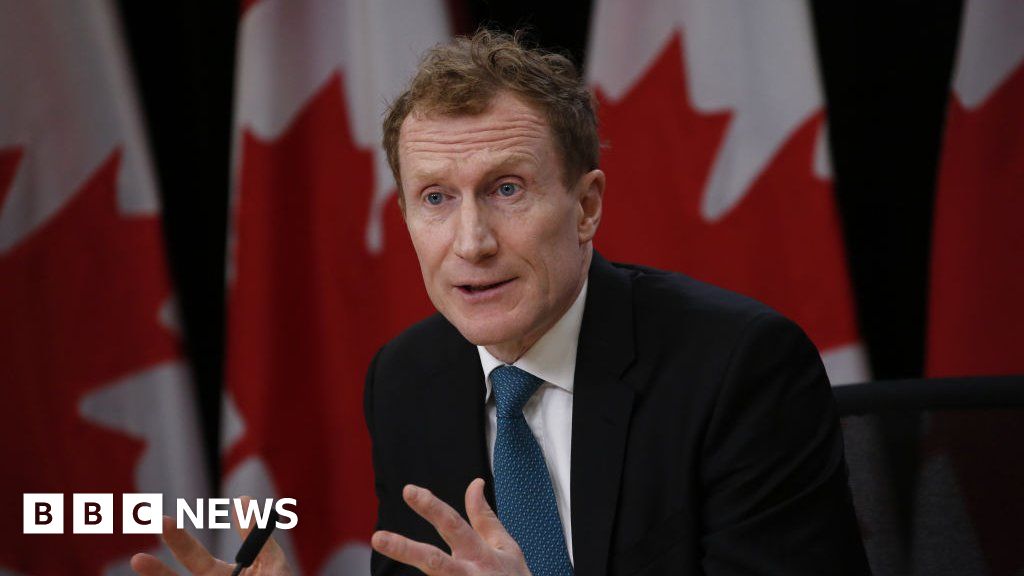- Written by Nadine Youssef
- BBC News, Toronto
Image source, Getty Images
Canadian Immigration Minister Mark Miller
Canada plans to set limits on the number of temporary residents it will allow in for the first time in its history.
Immigration Minister Mark Miller said on Thursday that the number would decline over the next three years, with the first cap to be set in September.
It will apply to international students, as well as foreign workers and asylum seekers.
The Minister previously spoke of reviewing immigration targets due to affordability and the housing crisis.
Miller said in his announcement that Canada plans to reduce the number of temporary residents to 5 per cent of the population, down from the current 6.2 per cent.
He added that this move aims to ensure “sustainable” growth in the number of temporary residents coming to Canada.
In recent years, Canada has seen a “sharp increase” in the number of temporary residents accepted into the country, Miller said.
As of 2024, there are a total of 2.5 million temporary residents in Canada, the minister said. That's up from nearly 1 million in 2021, according to numbers from national data collection agency Statistics Canada.
Miller noted that the country relies heavily on temporary foreign workers to fill labor shortages, but said that “changes are needed to make the system more efficient.”
It also has international obligations to allow the entry of people fleeing war and political persecution.
“To be clear, these are important global commitments for Canadians,” Miller said. “At the same time, there must be an honest conversation about what the rise of international migration means for Canada as we plan for the future.”
As part of the new policy, officials said some Canadian companies will have to reduce the number of temporary foreign workers they rely on by May 1, and will have a shorter window to prove that those positions cannot be filled by a permanent resident or permanent resident. Canadian citizen.
Two exceptions to this rule are workers in the construction and health care sectors, both of which face labor shortages in Canada. These workers will be allowed to enter the country at current levels until at least August 31.
according to Statistics CanadaIn 2021, the majority of temporary residents – about 40% – had a work permit. Students represent 22% of temporary residents, and asylum seekers represent 18%.
Others had a combination of permits – either study and visa, or family members of temporary residents.
Thursday's announcement was criticized by advocates for temporary foreign workers He told Canadian news outlet Global News That migrants work under precarious conditions and are “scapegoated for the affordability and housing crisis.”
This comes as Canada reinstated visa requirements for Mexican citizens due to a rise in the number of asylum seekers from Mexico.
Earlier this year, Mr. Miller also capped the number of international students accepted into Canada over the next two years, resulting in a planned 35% reduction in approved study permits.
There were more than 800,000 foreign students in Canada in 2022, up from 214,000 a decade ago.
The move has also been criticized, particularly by some post-secondary institutions across the country, which said they are concerned it will deter students from coming to Canada and push them to study elsewhere.
Some universities said the cap would mean a loss of revenue for their institutions.
These limits represent a major shift in policy for Canada, which has historically relied on open immigration to fill job openings and address a rapidly aging workforce.
It comes as Trudeau's government faces mounting pressure to address an increasingly unaffordable housing market.
Average house prices in Canada are now C$700,000 ($517,400; £408,750) and rent for Canadians has risen by 22% in the past two years.

“Unapologetic tv specialist. Hardcore zombie trailblazer. Infuriatingly humble problem solver.”






More Stories
SNCF: French high-speed trains disrupted by ‘coordinated sabotage’ ahead of Paris Olympics opening ceremony
Macron Responds to Left-Wing Efforts to Rule France – Politico
At least 229 killed in landslides in Ethiopia | Weather News